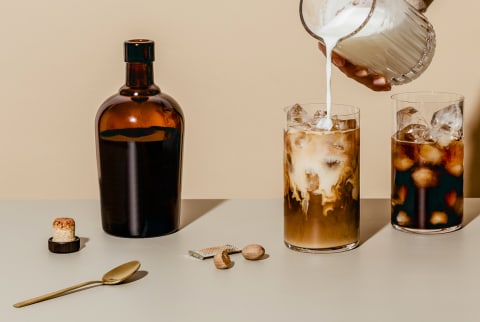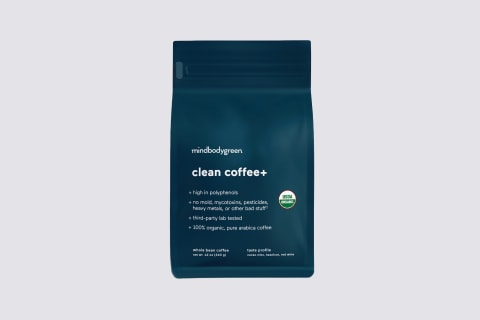Advertisement
How Cold Brew Compares To Hot Coffee & Why It Might Give You Jitters


Switching from hot coffee to cold brew is a seasonal rite that many look forward to once summer hits. The smooth, rich beverage goes down easy on hot days. But how does cold brew coffee compare to its hot counterpart in terms of health benefits?
We asked Marilyn Cornelis, Ph.D., a researcher at Northwestern University focused on the genetics of coffee consumption, to unpack how caffeine and polyphenol contents change once coffee gets the iced treatment.
How is cold brew different from hot coffee?
Cold brew is made by immersing coffee grounds in cold water (immersion method) or slowly dripping cold water over grounds (drip method). Both of these processes take significantly more time than hot coffee preparations. The drip method can require at least five hours, while the immersion method can take up to an entire day.
Since heat increases the solubility of certain compounds in coffee grounds, Cornelis explains that "with hot coffee, you typically find more caffeine and more polyphenols."
However, the longer you brew your coffee, the stronger it will be. This is why the data on exactly how much caffeine is in a typical cup of cold brew is inconsistent1. With such variation in brew times, cold brew's caffeine content can actually end up equal to, if not higher than, hot coffee.
"The temperature also contributes to flavor differences," Cornelis adds. Cold brew coffee tends to be less acidic, less bitter, and more sweet. This is because the different sugars, oils, and aromatic compounds in coffee oxidize at different rates. Sugars take longer to break down than acids. So the longer brew time of cold brew leads to a higher ratio of natural sugar to acids, leading to a stronger, sweeter cup.
The type of beans used can also affect cold brew's flavor (dark roasts are more bitter than light roasts), but they shouldn't impact its caffeine content too much.
Summary
Why does cold brew make me so jittery?
Feel jittery after drinking cold brew, or notice your anxiety spike? This could be a sign you're gulping down your brew too quickly or that you're sensitive to its caffeine content.
Cornelis has done some fascinating work on the genetics of coffee consumption, and it turns out that one gene (CYP1A2) is responsible for 95% of caffeine metabolism2. "Individuals with a particular variant of this gene consume more coffee while others who have the other variant consume less," she explains.
Interestingly enough, people with the gene variant that allows them to drink more caffeine also seem to have lower caffeine levels in their blood than those who don't have the variation. "This would suggest that these individuals, despite consuming a lot of caffeine, are metabolizing it very quickly. So they need to consume more," she says. "There seem to be some genetic underpinnings to the differences we see with caffeine consumption."
If you fall into the slower caffeine metabolizer camp, you can tone down the intensity of your cold brew by drinking coffee that has a shorter brew time or has been diluted with some water.
If you can drink cold brew all day without any side effects, you may be the lucky owner of a fast-metabolizing CYP1A2 gene. Go forth and sip on—there's overwhelming evidence to show that drinking coffee is a healthy habit.
In one cohort study on nearly 500,000 adults3 co-authored by Cornelis, drinking coffee (both decaf and caffeinated) was inversely associated with mortality. Participants who drank up to eight cups a day still seemed to reap longevity perks—though the FDA recommends capping your caffeine intake at 400 milligrams4 a day, or about four to five cups of coffee.
We still have a lot to learn about the compounds in coffee that are responsible for its health benefits. Is it caffeine, antioxidants, polyphenols, or a mixture? More research is needed to know for sure, but for now, Cornelis says one thing is clear: "There is strong evidence supporting that [coffee] is beneficial—at least in moderation."
The takeaway
Whether you're a year-round cold brew drinker or an exclusive summertime sipper, rest assured that the drink delivers the same health benefits of hot coffee—though it may have a slightly different caffeine content depending on how it was brewed. Feel free to sip or slurp to your heart's content; just be sure you're not drinking more than your genes can handle. Nutrition experts also recommend going easy on added flavorings and sweeteners. Luckily, cold brew's natural sweetness means that it's perfectly pleasant to drink black.
